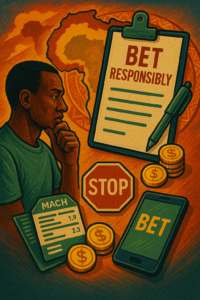
The notification buzzes on my phone—an 89th-minute winner has just converted my modest accumulator into a tidy weekend profit. Am I financing my retirement with this win? Absolutely not. But the rush of satisfaction as my prediction plays out, combined with the deeper appreciation I’ve developed for the tactical nuances of the game, represents exactly what recreational betting should be: exhilarating, enriching, and ultimately entertainment. I’ve spent years covering the sports betting landscape—interviewing everyone from casual weekend punters to professional syndicates—and the most content bettors I’ve encountered share one critical perspective: they view betting primarily as entertainment, not as an income source. During a recent sports betting workshop I attended, the facilitator opened with a profound statement: “If you’re here to get rich, you’re in the wrong room. If you’re here to enhance your enjoyment of sports while occasionally getting paid for being right, welcome home.” That perspective perfectly encapsulates the healthy recreational betting mindset. The reality is that sports betting, approached thoughtfully, can become a rewarding hobby that enhances your sports viewing experience, sharpens your analytical thinking, and occasionally pays dividends—all without the soul-crushing pressure of needing to win. Today, I’m sharing the blueprint for sustainable recreational betting that keeps the joy in the game.
Entertainment, Not Income: Setting Realistic Expectations for Hobby Betting
The foundation of healthy recreational betting begins with one crucial mindset shift: viewing your wagering budget as an entertainment expense rather than an investment opportunity. Professional bettors approach their craft with the emotional detachment of stock traders, while successful hobby bettors maintain the enthusiastic engagement of sports fans while accepting occasional losses as the cost of entertainment.
Think of it this way: a night at the movies costs around $20 for two hours of entertainment. A reasonably budgeted betting afternoon watching Premier League matches might cost $30-50 in net losses, but provides 4-6 hours of heightened engagement with the action. When framed as an entertainment cost-per-hour, responsible betting compares favorably with many other recreational activities.
The Mathematical Reality Check
Understanding the mathematical hurdles facing bettors creates appropriate expectations. With standard -110 (1.91) odds on spread or total bets, you must win 52.4% of your wagers simply to break even after overcoming the bookmaker’s margin. Achieving win rates of 55% or higher—the threshold for meaningful profitability—requires significant skill, time investment, and emotional discipline that exceeds what most recreational bettors can reasonably commit.
The Joy of Being Right vs. The Pressure of Needing to Win
The psychological distinction between enjoying correct predictions and requiring them creates the dividing line between healthy recreation and problematic gambling. Recreational bettors celebrate analytical victories and accept losses as learning experiences, maintaining emotional equilibrium regardless of outcomes. This balanced approach preserves the activity’s entertainment value through inevitable losing streaks.
Time Investment Realities
Professional-level betting requires 20+ hours weekly researching, analyzing line movements, and maintaining detailed records. Few hobbyists can commit such time alongside career and family responsibilities. Recreational betting works best when right-sized to your available time—perhaps focusing on one league you follow passionately rather than spreading attention across multiple sports.
Building Your Betting Fortress: Responsibility Systems That Keep the Fun Alive
Sustainable recreational betting requires structural safeguards that prevent the activity from expanding beyond its intended boundaries. These systems aren’t about restricting enjoyment—they’re about preserving it by ensuring betting remains proportional to your financial situation and emotional capacity.
The cornerstone of responsible betting is establishing a dedicated entertainment bankroll completely separate from essential finances. This gambling-specific fund should represent discretionary income you’re comfortable losing entirely, with absolutely no impact on your ability to meet financial obligations or life goals. Whether it’s $100 monthly or $500 annually, this predetermined amount creates both psychological and practical boundaries.
Time-Based Boundaries and Betting Calendars
Beyond financial limits, time boundaries prevent betting from encroaching on other life priorities. Creating a specific betting schedule—perhaps weekends only, or exclusively for premier events—maintains the activity’s special-occasion quality while preventing the constant engagement that often precedes problematic behavior.
Technology-Assisted Responsibility
Modern betting platforms offer increasingly sophisticated responsible gambling tools. From deposit limits and cool-down periods to reality-check notifications and self-exclusion options, these features provide valuable structural support. During my research interviewing recreational bettors who maintain long-term enjoyable relationships with betting, many specifically mentioned using responsible gambling features on platforms like 1xbet to maintain their predetermined boundaries.
The Social Accountability Factor
Involving trusted friends or family members in your betting boundaries creates powerful external accountability. Sharing your monthly betting budget with a partner or friend establishes an obligation to someone beyond yourself, significantly increasing adherence to self-imposed limits when temptation arises to exceed them.
The Psychological Playbook: Maintaining a Healthy Relationship With Sports Wagering
The psychological approach to recreational betting largely determines whether it remains an enjoyable hobby or develops into problematic behavior. Developing specific mental frameworks helps maintain emotional equilibrium throughout the inevitable winning and losing periods all bettors experience.
The foundational psychological skill is result detachment—the ability to separate your analytical assessment from outcome-based validation. When a well-reasoned bet loses to a fluke occurrence (a last-minute penalty, an unexpected injury, or unusual weather), recreational bettors recognize that their analysis can be sound despite the negative result. This outcome independence preserves confidence in your process rather than creating reactionary changes based on small sample results.
Here’s what separates healthy recreational betting psychology from problematic patterns:
- Acceptance that losses are part of the entertainment cost
- Enjoyment of the analytical process independent of outcomes
- Ability to walk away without chasing losses
- Maintaining perspective on the relative importance of betting results
- Using wins to enhance enjoyment rather than fund larger future bets
- Viewing betting as a complement to sports enjoyment, not its purpose
One particularly effective psychological technique involves explicit pre-commitment to actions following both wins and losses. Deciding in advance that wins go to a separate savings account while losses come exclusively from your predetermined entertainment fund prevents the common cycle of reinvesting winnings into progressively larger bets.
Beyond the Basics: Elevating Your Betting Experience Through Knowledge and Community
Recreational betting becomes most rewarding when it deepens your engagement with sports beyond mere outcomes. The educational dimension—learning to analyze matchups, understand market movements, and recognize value—transforms betting from simple gambling into an intellectually stimulating hobby that enhances your appreciation for the sports themselves.
The most satisfied recreational bettors I’ve interviewed consistently mention how betting sharpened their understanding of their favorite sports. Their viewing experience transformed from passive consumption to active analysis—noticing tactical adjustments, understanding context behind statistics, and appreciating nuances invisible to casual viewers. This educational component provides value regardless of betting outcomes.
- Focus on understanding one sport deeply rather than betting many superficially
- Study fundamental concepts like value, probability, and market efficiency
- Develop specialization in specific leagues, teams, or bet types you enjoy most
- Learn to calculate implied probability from odds to recognize potential value
- Build a structured pre-bet analysis process that improves your decision quality
The communal dimension adds another layer of enjoyment to recreational betting. Whether through online forums, social betting groups, or organized competitions, sharing the experience with like-minded enthusiasts amplifies both the educational and entertainment aspects. These communities provide perspective, help maintain responsible approaches, and create social bonds beyond the transactional aspect of placing wagers.
Red Flags and Warning Signs: When Hobby Betting Begins Crossing the Line
Even with solid boundaries and healthy psychological approaches, recreational bettors must remain vigilant for warning signs that their hobby may be evolving toward problematic territory. Recognizing these indicators early allows course correction before significant harm occurs.
The most reliable early warning sign is boundary flexibility—making exceptions to your predetermined limits “just this once” for special events or to chase losses. These seemingly innocent exceptions often become the rule rather than the exception, gradually eroding the protective structures you established. In conversations with recovered problem gamblers, nearly all identified this boundary erosion as the first step in their transition from recreational to problematic behavior.
Emotional Dependence Warning Signs
When betting transitions from enhancing your mood to determining it, caution is warranted. Feeling significant anxiety during bets, experiencing extended low mood after losses, or needing betting action to feel engaged with sports all indicate unhealthy emotional dependence that may require reassessment of your relationship with betting.
Financial Red Flags
Financial warning signs typically appear when betting expenditures begin affecting quality of life choices. Reducing normal social activities to preserve betting funds, experiencing difficulty tracking total betting expenditure, or feeling reluctant to fully calculate your betting profit/loss all suggest potential problems developing. The recreational bettor maintains complete transparency with themselves about their betting finance picture.
Time Commitment Creep
Gradual increases in time devoted to betting research, following in-play action, or analyzing past bets can indicate problematic escalation. When betting-related activities begin displacing other hobbies, social engagements, or family time without conscious reprioritization, it’s time to reassess your approach and potentially implement stronger boundaries.
Secrecy and Disclosure Comfort
Perhaps the most reliable indicator of healthy recreational betting is disclosure comfort—being entirely open about your betting activity and expenditure with significant others. Reluctance to share betting amounts, frequency, or outcomes often signals awareness that your behavior may not withstand external scrutiny, warranting honest self-assessment.
The Long Game: Sustaining Sports Betting as a Lifelong Recreational Pursuit
The ultimate measure of recreational betting success isn’t short-term profit but long-term sustainability—maintaining an enjoyable, controlled relationship with betting over years or decades rather than burning out through excessive losses or problematic behavior. This long-view perspective requires evolutionary thinking about your betting approach.
Sustainable recreational betting typically evolves through distinct phases as bettors gain experience and self-knowledge. Many begin with small, emotionally-driven bets on favorite teams before developing more sophisticated approaches based on value identification. The recreational bettor’s journey often includes periods of greater and lesser activity, reflecting life circumstances and interest levels rather than pursuing constant engagement.
The Educational Evolution
As knowledge deepens, successful recreational bettors often narrow their focus rather than expanding it. Instead of betting across multiple sports, they develop specialized expertise in specific niches they genuinely enjoy studying. This specialization enhances both entertainment value and potential success while maintaining manageable time commitment.
Technological Integration Without Dependence
Modern betting technology offers unprecedented convenience through mobile apps, in-play betting, and extensive market options. While these innovations enhance the recreational experience, sustainable hobbyists establish clear usage patterns that leverage technology without allowing it to drive increased betting frequency or impulsive decisions. Finding this balance—using technology as a tool rather than a driver—characterizes successful long-term recreational bettors.
The Lifelong Learning Mindset
The most satisfied long-term recreational bettors maintain genuine curiosity about their chosen sports and betting markets. They view betting as an ongoing educational journey rather than a destination, continuing to refine their understanding and approach over years. This learning-centered perspective maintains freshness and engagement while preventing stagnation in outdated strategies.
Community as Sustainability Factor
Long-term recreational bettors often embed their activity within social contexts that provide both enjoyment and accountability. Whether through formal betting clubs, online communities, or informal friend groups, sharing the experience with others who maintain similar healthy approaches reinforces responsible behavior while enhancing the social benefits of the hobby.
Finding Your Personal Betting Balance
The recreational betting journey is ultimately personal—the specific approach that provides maximum enjoyment while minimizing negative consequences varies significantly between individuals. Some find satisfaction in analytical depth applied to few, carefully selected bets. Others prefer more frequent small-stake wagers across various events to maintain ongoing engagement. The key isn’t following a universal blueprint but discovering your personal sweet spot.
What unites successful recreational bettors isn’t their specific approach but their mindful intentionality—they make conscious choices about how betting fits into their lives rather than allowing the activity to expand opportunistically. They recognize that sports betting offers legitimate entertainment value when properly contained, but requires thoughtful boundaries to prevent encroachment on more important life priorities.
Remember that recreational betting need not be a lifetime commitment. Many enjoy the activity during particular life phases or sports seasons, then step away without feeling compelled to maintain ongoing engagement. This flexibility—the ability to adjust involvement based on life circumstances, interest levels, and personal enjoyment—perhaps best characterizes truly recreational participation.
When approached with reasonable expectations, predetermined boundaries, and a focus on entertainment rather than profit, sports betting can provide years of enhanced sports enjoyment, analytical stimulation, and occasional financial rewards. The sustainable recreational bettor embraces the uncertainty inherent in sports while ensuring that only one outcome is guaranteed: that win or lose, the experience remains enjoyable, enriching, and completely within their control.





